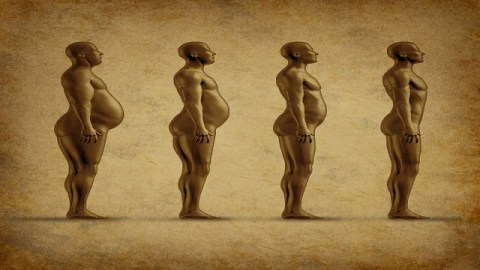What can a brain scan really predict?

I’ve never understood those weight guessing games offered at your more low-rent carnivals. Yet, across the country, people hand over their hard-earned dollars, driven by a curiosity about whether their physical beings sync up with a rather arbitrary number. I don’t get it–and said as much, on the Tilt-a-Whirl no less, to a male friend once. He laughed and said, “A more helpful trick would be a carnie who can predict just how heavy your date will one day get.”
It was a joke–but one that came to mind when I read that Dartmouth scientists found that activity in the nucleus accumbens could predict weight gain and sexual behavior in individuals six months later. Forget carnies–maybe all guys like my friend need is a brain scanner to predict what their dates will one day weigh.
The study’s premise was fairly simple. William Kelley and Todd Heatherton, professors in the department of psychological and brain sciences, used functional magnetic resonance imaging (fMRI) to track blood flow to the nucleus accumbens, an area linked to reward processing and pleasure, while college students viewed images of animals, people, appetizing food and various static environmental scenes (including those of a sexual nature). They then had the study participants come back and fill out a behavioral questionnaire six months later–as well as step on the scale during both visits.
Interestingly enough, individuals who demonstrated high activation in the nucleus accumbens when viewing those yummy food images were more likely to have gained weight in the interim. And those who liked the sexual images? You guessed it: they were getting significantly busier than their peers. The findings showed a “material specificity”–food activation begat weight gain, sexual activation begat more sex. The two did not overlap.
It is an interesting study. And one of the first to try to correlate brain activity with future behavior in a normal population. But it begs the question: what can a brain scan really predict? And for what can we–and should we–use those predictions?
Psychiatrists across the country have attempted to use brain imaging data to predict who will develop certain neurodegenerative or psychiatric disorders–and even have tried to predict who may grow up to be a criminal. It’s not easy work. At best, most of these studies can only offer predictions slightly higher than chance. Better than a coin flip–but only just.
Given those kind of probabilities, the even harder question is what to do with the results. Should all individuals who show nucleus accumbens activation when looking at chocolate cake be given nutrition classes? Should we offer them self-control advice or limit their caloric intake? Should those who have a high probability of a certain disorder be monitored? Should those who have a “criminal’s brain” be incarcerated before they commit their first crime? These are extreme examples–but it does make you wonder.
The Dartmouth researchers are, for the most part, interested in the processes underlying self-control. Perhaps understanding why an ice cream sundae is such a trigger, lighting up the nucleus accumbens like a Christmas tree, can help researchers and clinicians understand how people overcome their temptations and urges. It’s an interesting thought.
But, generally, only a dozen or two individuals are scanned in these prediction studies. Can what we see in a small group really be applied to everyone? Not to mention that this participant set was a group of new college students. Would you see the same activation if they were scanned again in one year? In ten? In twenty?
I’m curious to hear what you think. What do you think a brain scan can really predict? And what do you think we should be doing with these kinds of results?
Credit: Lightspring/Shutterstock.com





